Theatre Reviews
ALL THE BENS - 1974 Productions

What a cracker to start the Fringe this year! Ian Townsend’s play has, justly, won awards from its inception in Manchester some 7 years ago, and which is now targeting its future in festivals and venues.
It’s about falling in love, or rather hoping to, claiming to, pretending to: about the hopes, fears, pleasure, rejection, periodic rebuilding of trust. About the games we play - we've all been there, surely.
A three-hander with Ben, who's gay and looking for a partner; Al, with whom he has an exciting one-night stand but then turns out not be gay and not to want any further relationship … or maybe? And Ben's brother Henry who has physical & learning difficulties, attends a special school: Ben has the duty of care and they live together. It’s inevitable that Henry’s needs and obsessions get in the way of Ben's ambitions and the relationship between Ben and Al as it kindles, and the play shows us the warmth that developed between each pair of the three. Games in the park, Henry’s obsession with numbers - he insists on rating everything in his life with a score up to 7. So what is it that scores 7½ ?
Minimal scenery but we barely notice: the three strong performers move from place to place, time to time, scene to scene, impeccably, each one sitting out imperceptibly so that the flow is smooth and unbroken. Great use of the simple stage, and while it’s not a comedy there's a great deal of humour in amongst the sensitive emotion, always handled with a light touch.
And how does it resolve? Happily for all, but there’s no precise spoiler here.
Michael Quine
ANGEL CARDS WITH JANIS - Fishhouse Theatre

Once again Fishhouse Theatre have created a completely different type of theatre which is fresh, engaging and interactive. Janis (Lesley Emery) plays Madame Norashe, who will reveal the past, present and future for you through cards and stories. Go along with a question or two and participate in this delightful performance, a skilful combination of scripted and ad-lib and you will find out more than you bargained for. Janis will disclose little snippets of her life and hopes which will make you laugh and move you at the same time. It was a little like sharing dreams with an old friend. Be prepared to help read the cards and share your own interpretation! You will even leave with an angel card of your own.
If you have half an hour to spare, visit the Leewood Hotel perhaps with a friend, and book a session with Madame Norashe (check the programme for times). I promise you will feel uplifted and positive afterwards. I did!
Fishhouse Theatre are regulars at the Buxton Fringe, winning awards and nominations and consistently coming up with new and creative ways of entertaining us. Cloaks and Being Julie Andrews are just two of their very popular and successful plays and we look forward to welcoming them again at next year’s Fringe. They also can be found performing with Live and Local Rural Touring Scheme (http://www.liveandlocal.org.uk) from October to April.
Sandra J Cooper
ARE THERE MORE OF YOU? - Hint of Lime Productions

Here we have 4 short pieces, monologues, told by Alison Skilbeck who brings with her a long trail of awards and nominations, on top of a busy career throughout the UK and abroad. She has spent 5 years working with Alan Ayckbourn, and there's nowhere better than that to learn write about and expose middle class angst and ambitions.
That’s what she does here. There’s one narrative where Claire, the wife of an Ambassador, is suddenly and unexpectedly abandoned by him and has to return to the UK to make a new life and mix with old friends, reflecting on what was and might have been: and one, set in an Italian restaurant in London, showing us a black-humour centre and a lovely twist at the end.
For this reviewer, the best and most interesting opens with the character Sara performing some gentle hand manoeuvres facing us centre stage: she explains she’s weaving, picking odd strands out of an item she’s repairing and extending. As this piece develops, we discover she’s a mind-weaver: she’s acting as some kind of therapist helping other people sort themselves. The imagery here, as it develops, is fascinating, exploring pretensions as they interface with real life.
Each of the four pieces could be taken independently – they are four different characters and personalities – but Skilbeck has chosen to have them living in the same postcode area. It’s not clear what that does for us the audience save that we are able to hear references to characters we know in different contacts.
It’s billed as “a one-woman comedy drama”. Not by any means a laugh-out-loud comedy, but plenty of chuckles of recognition along with the warmth of the character observation.
Michael Quine
AUTHOR, COMPOSER, SOLDIER-OF-A-SORT - Hint of Lime Productions

Billed as a celebration of the friendship between the First World War poet and composer, Ivor Gurney, and musician and pioneering music critic Marion Scott, this one-woman show is written and performed by Jan Carey. The story is a very moving one – the two meet at the Royal College of Music, become close both professionally and personally, and Gurney enlists in the 1st World War effort. He continues to write poetry and music, influenced both by what he witnesses in the trenches and remembers from his native Gloucestershire, and sends them to Scott, but is later gassed and discharged. On returning to his homeland his health and sanity deteriorate.
Carey is a most engaging performer who plays both roles, mostly standing for the soft cadences of Gurney’s Gloucestershire accent and seated for Scott’s more clipped tones. She conveys the essence of both characters effectively – Scott is a pioneering music critic who breaks into a male-dominated world, demanding blind auditions for women perfomers, Gurney a nature-loving dreamer, unteachable, and while his look may be one of force he is thoroughly ill-suited to the military career he embarks upon, hence the last bit of the title. Ironically, Gurney felt that fighting at the front might strengthen in him any mental weaknesses, whilst the very opposite proves to be the case.
Carey jumps seamlessly between the two roles, and the bond and admiration between the characters is plain to see. A one-person show risks being a little static by its very nature, and there is little by way of dramatic action or setting, but the text – narrative, imagined dialogue, interior monologue, diary-style entries – is varied and well-written. There are some arresting images, such as Gurney’s emaciated body making his uniform seem like a flag on a pole, and the thin rain weeping at dawn. The heart-strings are not torn at in melodramatic fashion, the writing not sensationalised, yet one feels tremendous sympathy for the aging woman who lost her fiancé to the war, to the suffering ex-soldier who has been reduced to a penniless vagrant singing for his supper, going through life without an anchor. The simple description of Scott’s tears on leaving Gurney in hospital, and on seeing the broken body of a blind young soldier are very moving and reflect the pointless horror of war.
Gurney is described as the English Schubert, a bold claim (and one which his later teacher Vaughan-Williams might have been interested to hear) but I enjoyed the recordings of Ian Partridge (tenor) accompanied by Jennifer Partridge on piano and could have listened to them a lot more. The play is directed by Michael McCaffery and produced by Hint of Lime Productions.
I recommend this show to you – it certainly deserves a much larger audience! It is on at the Rotunda on the 6th and 7th July from 6 until 7, which is easy to remember.
Ian Hamilton
AUTOPSY - Despite The Monkey
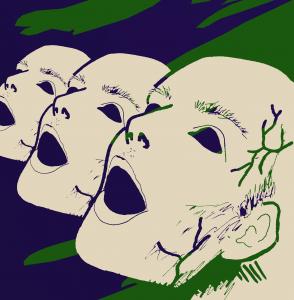
In spite of technical difficulty that did unfortunately lessen the depths of the promised immersive, 3D experience, the Autopsy production is a creative and intriguing exploration of theatre and audience interaction, one certainly not lacking in ambition and potential. Billed as a ‘Lovecraftian’ influenced pulp horror, Despite the Monkey present something confusing, unsettling and, for those of the right persuasion, enjoyable.
Underground at The Old Clubhouse is a suitably intimate venue for a performance that relies heavily on the viewers (or perhaps listeners is a more apt description) ability to relax and to fully submerge themselves into the story. Do not be surprised if you feel an urge to close your eyes, and do not be afraid to do so, I assure you other audience members will be feeling the same. However, should you wish to abandon the visual, ensure you have fully indulged in adequate period of focused staring at the solitary movie projector stood stark in the centre of the stage. It’s mechanical, rhythmic whirr provides the perfect basis onto which further sound is placed; individual voices heard in headphones are complemented by this background hum. In terms of its appearance the projector, with it’s 1980’s allusions is suitably befitting of the pulp horror genre, and yet it is simultaneously futuristic, the centre of the mesmeric spinning is a point of pure focus.
The performance begins with a woman’s voice, whether or not the story she tells is merely intended to set the tone for the later tale or this is meant as a specific thread that weaves each possible path together is uncertain. It is shortly into the production we are presented with a choice; Black Mirror’s Bandersnatch has certainly had some influence. Option 1,2 or 3, which will it be? If you attend purely due to the promise of viewer control you’re best sitting toward the front on the right hand side, as it is not the audience who chooses, but a single audience member. The narrative that follows is then played out in full; though I am unable to speak for each available option, it is likely you to will be left unsure as to exactly what the two different tapes have in the way of connection. The story is interesting, mildly surprising, though to call it a horror may be a stretch, but it is the medium that is the most intriguing, clever and original, the clear focus of creative energy,
This piece is very promising, and it really does feel like it could go somewhere and be something quite important and entertaining. The concept is innovative and exciting in comparison to typical theatre, and I think for that reason alone Despite the Monkey have succeeded in creating an unique experience in a mere 30 minutes.
Anna O’Boyle
BETWEEN US - Alex Keen & Rachel E Thorn

In the Fringe programme Between Us promises to explore what makes us fall in love and what makes us fall apart through the inside story of one couple’s relationship. The opening night charted the relationship between Rachel (played by Rachel E Thorn) and Alex (played by Alex Keen). Rachel was an uptight accountant and Alex a bicycling devotee with friends in a commune. The performance followed their developing relationship from their first meeting over dinner to moving in together, using sections of dialogue and occasional monologues from both characters. The dialogue explored common themes in relationships such as meeting each other’s friends, insecurities over old partners and differences in lifestyle and expectations.
Overall it was an entertaining play with likeable and well developed characters. But wait...this play didn’t exist before the performance started. Thorn and Keen weren’t working from a script. The show started with a request for memories from the audience. Any fear that this would turn into a show with extensive audience participation was quelled when Thorn and Keen swiftly chose one of three proffered memories to form the basis of a character. Alex’s hippy-ish character was inspired by an audience member’s recollection of an Alex who hid jacket potatoes during a childhood wide game. Wide games, for the uninitiated, are outdoor games such as chase the flag played in wide open areas.
From such an apparently slender beginning Thorn and Keen created two believable characters and the burgeoning relationship between them. It was hard to remember it was improvised, as the dialogue flowed with few pauses. The improvised format meant both audience and performers were kept in suspense about what would happen next. For example, in the middle of a heated debate about each other’s friends when Alex said he didn’t like Rachel’s friends she suddenly admitted she didn’t like them either. Improvisation wasn’t confined to words. The set consists of two chairs, and the performers create meals, drinks and a kitchen out of thin air.
This is a masterful demonstration of creativity on the spot. And the best bit is that I can go and see it again, as it will be an entirely different performance. This is inspired innovation – don’t miss it. Between Us is playing every Tuesday (9, 16 & 23 July, 10pm – 10.50pm) for the rest of the Fringe. Then Between Us is going to Edinburgh.
Georgina Blair
CITY 125 - THE CLUB WITH NO HISTORY - Dreamshed Theatre

We are promised a romp through Manchester City’s history to coincide with the club’s 125th anniversary, and, intriguingly, a loose approach to actual facts. This revue-style show is written and directed by Bill Cronshaw in which he and John Martin-Stevens perform multiple roles.
My heart sank slightly as I saw a large screen and projector at one side of the room (no disrespect to technician Chris Stone); the only other visible prop was a table covered with football paraphenelia - a scarf, a book, a magazine, a half-eaten pie and a strange-looking musical instrument, along with the kind of leather football that made your head ache for days after heading it. Soon, however, I was reassured by the presence of real actors.
Cronshaw and Martin-Stevens perform a wide variety of roles – judge, vicar, brash businessman, young and ageing fans (once a blue, always a blue), and apparently after being let down by actresses, a fairy, a daughter, a wife and a mother (although not all the same person). They take us on a nostalgic tour of the 125 years of Manchester City’s history, and although this is anything but a dry historical lecture, there is enough fact there for the genuine footballing anorak – the rowdy social conditions in industrial Britain of the 17th and 18th centuries, when kicking a ball was made illegal and which predated the formation of the football league, the club’s beginnings in Hyde Road and later move to the much-lamented Maine Road, up until the present glory days at the Etihad. The latter feature only briefly, with blue-tinged nostalgia being the order of the day, but we are reminded that the club’s back-story was not always ‘amazing feats at every turn’; from about 1956 until the present day it has often been their supporters’ lot to admit hardship, always see it through, take the rough with the smooth…
Nonetheless this is a very jolly romp, peopled with entertaining cameos. My favourite character was the young dreamy fan’s Scottish mother setting out her conditions for her son to go out and play, and I enjoyed the latter’s performance as a Bert Trautmann-obsessed goalie. I am still struggling with the image of Bert in a gabardine and balaclava. Other enjoyable cameos were the supporters in Wythenshawe hospital and the boy’s team manager. The word comedy should prompt warnings of audience participation, however – just ask the long-suffering Leo. Yet there were more serious moments, such as the protagonist’s sadness at the end of the Maine Road years, to be replaced by the age of ‘customer experience’ and big bucks.
The performance is punctuated with versions of appropriate songs from the terraces and at one point Cronshaw accompanies himself on auto-harp. The big screen depicts scenes from Maine Road, its terraces and surrounding houses vividly and in doing so brings home to us a bit of what we have lost. There is also footage of George V, and, arrestingly, the 1958 Munich air crash which, we are reminded, united football fans across the city.
The versatile actors perform their roles with great aplomb and expertise and Cronshaw is also an engaging compere who interacts naturally with his audience. To see the enthusiasm of such obvious devotees gives hope for the future of the game, although there is enough comedy and social history for
this show to appeal to non-football fans. The decent-sized audience was testimont to this, and included a lady just retrned from the African Nations’ Cup!
I highly recommend this show to you – it is on again on the 7th July from 3 – 415 so you had better be quick. The group also perform in non-theatrical venues for social events and if you are interested in this you can contact them on: bill@dreamshedtheatre.co.uk (07771 965985)
Ian Hamilton
CONTRACTIONS by Mike Bartlett - Buxton Drama League

Interesting two-hander from Buxton Drama League. Not an easy one to pull off as, despite the publicity claiming, ‘absurdly, wickedly funny’, it is quite horrific but well worth seeing for that. Don’t go expecting belly laughs, the subject matter is quite frightening but also very much in the spirit of our time – corporate procedures too often trumping (yes, that’s the word isn’t it) humanity and discretion. Always the sneaking feeling in this play that it could happen – indeed it almost is happening and that’s what makes it horrific. Any laughs extracted from this are at the sheer ridiculousness of the situations.
Corrinne Coward as The Manager and Maria Carnegie as Emma do an excellent job in building the tension; their dialogue doesn’t miss a beat. Corrinne totally pulls off the shocking impassivity and callousness of her role – almost found myself watching her through fingers over my face. Great attention to detail – wagging of a foot giving away the manager’s relish of her power at a particularly edgy moment. Maria strongly and convincingly bats back Corrine’s curved ball interrogation throughout the performance and does a great job in slowly revealing the character’s frailty and humanity. Maria proved so well that acting is not just about the spoken words; her facial expressions were subtle and very, very real – a glance cast, a look away, a slight flinch, a stare.
These two actors complimented each other’s parts so well and so plausibly. Well done also to director Jim Gillespie for making it work.
Jim Marriott
DEBRIS by Dennis Kelly - Despite The Monkey

Debris (Dennis Kelly’s first stage play) is an immersive production, that is intense and at times, overpowering. It starts with a Crucifixion and ends with a dawning understanding of the journey taken by those involved. How can a child cope with a deeply traumatic event and make sense of their life? They create their own reality that’s how. If you like a production that challenges your idea of how to watch theatre and can deal with some strong themes, then this really is a show to watch.
Dean Gregory as Michael and Lydia Cashman as Michelle were captivating in their roles of brother and sister, the interplay between the pair perfectly showed the intensity and love siblings can experience. Their portrayal had the audience wanting to believe their tales, even though you knew the majority of what they were saying was a fictitious safety blanket. Michelle’s entrance was a fantastic birth of a character. Their direct eye contact with you as an audience member made you feel directly involved, a voyeur in the unfolding action.
The use of sound made it seem as though the two characters were talking directly to you, into your own head. These voices in the head make the blur between reality and the story telling of a child more intense. The confusion of genders in some of the voice only characters served to make you question further the reality of events. On a technical issue I would say that at times the sound levels were uncomfortably loud.
The director (Harry Machray) has staged Debris in traverse, enabling the actors to fully connect with the audience. It is good to see a company thinking about the space in a different way.
Congratulations on a show that challenges an audience on how to experience theatre .
Jayne Marling
DESERT BLOOM - Plush Tiger Productions

After five years of taking productions to both the Brighton and Edinburgh Fringe festivals, South Yorkshire based Plush Tiger Productions finally have an opportunity to perform to a ‘home crowd’ at this year’s Buxton Festival Fringe with a new version of Clara-Nel Haddon’s Desert Bloom, an extraordinary tale of one woman’s search for identity and the blurred lines between fact, fiction, fantasy and fake news. Everyone has a secret. Rosarita, a fragile Nevada bloom, reflects on her past from the sweltering heat of her trailer, sustained only by cool drinks and night walks, and wonders if she herself has been transplanted into the wrong soil. A tale of discovered identity, a troubled upbringing, of an ordinary life which hides an extraordinary secret. Enter Marilyn Monroe, who soon becomes the subject of the drama. But what is the mysterious connection between the two? From the arid heat of a Nevada trailer park, Rosarita gives us an insight into the lives and intimate secrets of Monroe, Kennedy, Joe DiMaggio and Arthur Miller. Valerie Monti-Holland is captivating in this one-woman show as a whiskey-sour downing lush (the sour mirroring her mood) who has seen better days, although it is some way into this performance that we discover that her ‘boudoir’ is in fact part of a trailer park. The other big revelation of the play comes even later. We cannot help being drawn into her story.
I was spell-bound by Valerie Monti-Holland’s story of Rosarita, which was moving without being melodramatic, especially as she reflects that all she ever yearned for was a mother to love her, but a little less so as the play became more focused on the seamier side of 1960’s public life in the USA as it went on, culminating in sinister conspiracy theories which spread their net far wider than the story at hand. Monti-Holland adopts various voices of the great and good from this dubious era, but for me the real drama is in Rosarita’s story itself rather than the involved history-relating which comes later.
There is a lot of poetry in the piece, both in the several references – Bronte, Dickinson, the desert of Gray’s Elegy being evoked at the end – and in the many arresting and unusual images of the writing – Rosarita having her petals pulled slowly off by her ex-husband, love being a ship on the horizon, a human coat-hanger, a frozen Eskimo pie, the amber sun slipping away on an ether sea…The various scenes are interrupted by genuine-sounding audio footage from the era, down to the crackles. The original play, which has already been performed at the Edinburgh Fringe, was written by Clara-Nel Haddon, and on this occasion performed by Valerie Monti-Holland, locally (ish) based and making a return to performing, and directed by Mick Connell and Ray Globe; my thanks to the latter for permission to use his programme notes. South Yorkshire based Plush Tiger Productions formed as a theatre collective in 2015 with the aim of producing new work. To find out more about the title of the production company, and indeed of the play, as well as other spoilers I have endeavoured to avoid, come and see it at the Rotunda on either the 12th July at 6 pm or the 18th at 3 pm. There is a small amount of strong language and the play is recommended for ages 14+.
Ian Hamilton
AN EVENING WITH MISS WONG - Grist To The Mill Productions Ltd

Miss Anna May Wong invites you to join her in an evening of song and remembrance as she tells the story of her life. A tragic and wonderful life that saw her rise from the stereotypical laundry girl to become one of the acting elite. Miss Wong was the pioneering first Chinese Lady of Hollywood who became one of Hollywood’s best loved stars.
A tale of triumph through adversity within Hollywood nostalgia, An Evening With Miss Wong, performed by Michelle Yim, is an autobiographical musical cabaret telling the story of Miss Wong: her life, her career and her personal struggles. How she found it difficult to break through into Hollywood as a Chinese artist in the white dominated era of the 1920s.
Michelle Yim brings Anna May Wong to life, through factual storytelling with personalised anecdotes and songs from Miss Wong’s European tour. One of the songs used actually had no melody before the show, so credit to the team for creating and using this piece. Michelle’s voice is beautifully suited to the intimate venue of the Rotunda Theatre, and the sound through microphone and backing tracks was well balanced in what could be a difficult venue from a technical aspect.
A few technical errors did not detract from this truly fascinating story, with light humour; funny anecdotes and period costumes. The show would be suited for both fans and non-fans of Hollywood & the movies and is on at the Rotunda Theatre on 16th July at 7.30pm.
Tony Owens
FUNNY IN REAL LIFE - Helen Rutter & Rob Rouse

This is a tremendous show, full of life and energy, confident and assured, very funny and observant, with the delight of watching Rob Rouse loping all over the stage, teasing the audience, maybe pushing at the boundaries of good taste, and then getting his come-uppance when his wife interrupts by forbidding him to talk about her or, later, their children on stage.
We see him being silenced by her: she's the butt of much of his script and without her to talk/joke about he’s left with no material. Put down, he keeps trying to bounce back like one of those stand-up-again toys for children. We see the argument between them: it develops, the humour flares up with more of his routine started and then abandoned in the face of further opposition.
She tries to turn the tables - "make it a show about you, instead of me” - but that doesn't work. He tries to get his own back. That works for a bit, but not for long though it does open up a new area of debate and a delightful prop – the only one – which takes us into a new dimension.
Watching Rouse long-leggedly loping all over the stage, engaging with the audience, ad-libbing and (of course) going off-script, is pure joy. There's one moment when he talks to and hopes for a response from one member of the audience, on what might be an embarrassing subject. He chooses the late-comer. Either he was dead lucky that this Steve played up wonderfully, or Steve was pre-warned and pre-prepared. It felt as if he hit lucky and there was real ad-libbing rather than something scripted.
Thoroughly recommended. Rob Rouse and Helen Rutter (yes, his real wife) have created a convincing show which morphs happily from its secure and convincing stand-up start to something even more satisfying.
Michael Quine
GOING SLIGHTLY MAD - Big Mind Theatre

Going Slightly Mad is a place based on a real life experience in an NHS psychiatric ward told through Max who has been sectioned but doesn’t know why.
Max doesn’t believe or want to believe she is in a hospital, and Lizzie Lewis’s portrayal of Max conveyed her confusion and pain to the audience but with humour - “I thought I was Jesus, but that’s arrogant, I’m God” - which showed all sides to her personality and illness.
Throughout the play all the other cast members switched frequently between inpatients and nurses with different physicality, accent or line delivery showing their impressive versatility. Tilly Botsford stood out with her portrayal of Anna,as she was able to convey the seriousness of the dark moments of suffering from mental illness but to bring out the comedy with lines like “NHS socks. This is not my first rodeo”.
Elements of physical theatre allowed the company to explore the lack of control people with mental illness experience over their own mind and body, and Leon’s (Levi Mattey) breaking the fourth wall allowed the audience to participate in the play and have some influence over the story, nicely illustrating how the outside world affects the mind of the mentally ill but also the way the world outside of the hospital affects life within the hospital. Though the play may benefit from an awareness that during intimate conversation a more open stance will help to include the audience.
Particularly with a Karaoke scene, this piece reminded the audience of the fact that those suffering from mental illness are still normal, human beings that often just need a little guidance. Going Slightly Mad is a brilliantly acted and staged piece of theatre and a refreshing take on mental illness and people’s responses to it. I highly recommend it.
Anna Walker
THE GRANDMOTHERS GRIMM - Some Kind Of Theatre

We all know some fairy tales derived from the Brother's Grimm. Little Red Riding Hood, The Frog Prince, Sleeping Beauty, The Beauty and the Beast and Rumpelstiltskin to name a few. Most of us know that the original Grimm tales are a bit stranger than the sanitised modern versions. However the sources that the Grimm brothers used were even stranger and often deeply gruesome.
The author of this play (Emily Ingram) creates a fictionalised account of a meeting between the Grimm brothers and one of their actual sources Marie Hassenpflug. The Grimm brothers together with Marie and her maid act out some of the original versions of the stories that were adapted by the Grimms for their famous book. These versions also involve princesses and princes and animals but the events are very different from the stories that we are familiar with.
In the play Emily explores how the tastes of the Grimm brothers and the mores of the time shaped the versions of the stories that the Grimms recorded. She also points out how the Grimms did not acknowledge their sources (which were very often women) in print and that they characterised women as pursued and punished with limited agency.
The play is fast paced and covers a lot of ground in an hour. It is well written and acted and is both eye opening and fun but it is not suitable for small children.
Alex Watts
GRATIANO - Grist To The Mill Productions Ltd

This minor character in Shakespeare’s well known play, The Merchant of Venice, is colloquially known as ‘The Serpent of Venice’. This production is both written and performed by the very talented Ross Ericson, offering a word-perfect, solo one-hour performance.
The plot is brought forward from the 17th to the 20th century. The initial set is a cobbled street of unknown whereabouts. A scruffy Gratiano appears, poorly dressed in mismatching baggy tweed trousers, blue over-shirt and black and white shiny shoes. Not a pretty sight!
His main aim is to win over Nerissa, one of two ladies, who are dressed as men, cross-dressers as it turns out in this modernisation.
The scene now shifts to a bare prison cell, suggested by a barred rear window. He has been charged with the attempted murder of Shylock, a grasping Jewish money-lender, but as this can’t be proved, he is released and returns to the initial scene of the cobbled street.
This is when the plot is skilfully brought into the 20th century with the last scene describing the persecution of the Jews during the Second World War, when they were rounded up and tattoed with identification numbers before being herded into cattle trucks and taken to extermination camps. In a moving last scene we realise the true cost of Gratiano's pledge to extinguish his enemy Shylock.
This is only a part of the entire play; it is written and dramatically performed by the talented Ross Ericson. His acting is so incredibly believable as he brings the role of Gratiano, one of Shakespeare’s lesser known characters, to life. I strongly recommend this well-acted and presented play to everyone.
Jackie Corrigan
GREEN KNIGHT - Debbie Cannon

The story of Sir Gawain and the Green Knight dates from the late 14th Century. Originally, a poem, it tells the story of a knight’s quest. Two main themes thread the entire story - the courage needed to face a seemingly unwinnable challenge and Sir Gawain’s struggles with temptation.
Talented performer, Debbie Cannon, returns to the Buxton Fringe Festival after winning the Best Female Actor (2018) for her performance of the same show. It is easy to see why she won that accolade. From the moment she appeared in the room at the Green Man Gallery, the audience became totally immersed in the story and her performance.
This is no ‘Jackanory’, style rendering, where the storyteller is rooted in a chair. Debbie utilises the entire space. Her voice and physicality are enhanced further by the use of just a few props including a sheet, an apple and a spoon.
She is mysterious, feeding us little clues here and there as the story progresses, never uttering her name, although by the conclusion of the show we know who she is and the role she played.
She sings, dances and jokes with the audience – there are some very funny moments, but there is also introspection. We care about this narrator and how things will turn out for her.
In one of Debbie’s opening lines she told us, “I love these stories”, and her enthusiasm and skill bears this out. This fantastic story has endured for centuries and Debbie has taken the source material and created a completely unique and accessible version for the modern audience. I would urge you all to take advantage of her return to the Buxton Fringe and see this show. It really is unmissable.
April Irwin
HOME - JustOut Theatre

We meet 16 year old runaways Lauren and Reece with their baby Hal moving into a grotty flat, deliberating whether to spend their precious money on a vacuum cleaner or food.
This sets the tone for the harsh reality of juggling school and working double shifts along with bringing up a new-born baby. Alienated by other new mums and old friends the cracks begin to show. All of this whilst surviving on a steady diet of Pringles and a loaf of bread.
Torn between the alcoholic abuse of Lauren’s mum and the helping hand of Reece’s mum the teenagers try to make the best of things. But is their love for each other enough? Can they overcome the constant tiredness and stop bickering? Will they just become ships that pass in the night?
A shopping trip and a missing baby are the catalyst for some drastic actions.
Some great acting and the slow pace and language are appropriate to depict the frustrating drudgery of teenage parenthood, along with some lighter moments to the soundtrack of 60s Motown.
Karen Wain-Pimlott
JACK CRAY: THE FITTEST GUY ON THE STREET - Jack Cray

This reviewer went along hoping to see something theatrical, something with drama tendencies, even though the show was billed as being in a ‘Lecture Room’: hoping too for a worthy addition to the increasing repertoire of theatre pieces about long-term conditions and their interaction with normal life (whatever that is).
This piece, in Buxton for just two performances (15 and 16 July) on its way to the Manchester Fringe, offers in performance a friendly talk and chat with the audience, telling us about how epilepsy came upon him at around the age of 17 and how it’s treated him since. To be sure, there was only a small audience at the first performance, so that great dramatic gestures would have been totally out of place. But even so, Jack Cray’s style is to be quiet, informative, direct to audience.
It might feel a bit like an informal lecture and we did learn just how many are diagnosed with epilepsy each year (32,000, since you ask): how the brain weighs just 2% of the body weight but consumes around 20% of the energy burn: how there are very many forms of epilepsy: what it feels like to have a seizure: and what to do for someone who has a seizure. However, facts like these are wrapped up in his tale from age 17 up to now with some chuckle-worthy anecdotes. He uses them to good effect: wouldn’t dare play a 9,000 audience in a big arena since 90 of them would be cross when they heard that across the board one in 100 has epilepsy … ("which 90 of us…?")
To be sure, it could have been a talk to friends, an informal talk at the local (you name it) club, presented with good humour, personality, acceptance, a rare openness, and some neat anecdotes along the way. The two moves into a ‘theatrical’ mode involved him talking and interacting with on-screen video film – himself or another played by himself – and this plays very successfully, neatly timed and appropriately bossy one way of the other.
In conversation afterwards, he told us that he finds it impossible to talk about his case and his circumstance in normal conversation: and yet that’s just what this neatly scripted performance delivers to its audience. He says he wants to avoid too much ‘theatricality’, and in the contact of that lecture room he was dead right – he creates the right atmosphere.
Michael Quine
JEFFREY BERNARD IS UNWELL - Sudden Impulse Theatre Company

Waterhouse’s comedy based on the dissolute life of racing correspondent Jeffrey Barnard takes place with the protagonist being locked overnight in a pub. He begins to reminisce about his wives, girlfriends and life. The title, of course, refers to Jeffrey’s frequent failure to file his column due to hangovers and general dissolute behaviour.
Staged as being contemporary, the play has not dated at all and is witty and sharp throughout. The main character’s monologue (by Phil Malkin) was supported by sharp interactions from the many characters in his life: doctors, magistrates, wives, lovers etc. (played by Sam Ashbury and Eleanor Charman) and provided much of the humour.
Keith Waterhouse begins and ends this biographical play with a classical style ‘chorus’ - a brief commentary to set the scene and give perspective on the protagonist’s life.
The lively mixed audience in the Arts Centre Studio included many young people who may not have known that Jeffrey was actually a real person and not fictional. Like all present they enjoyed the play immensely.
It may have been a co-incidence but at the end of the play many of the audience headed straight for the pub. Hopefully they were not locked in.
Further performances 17th, 18th, and 20th July
Brian Kirman
JORDAN - Easy Company
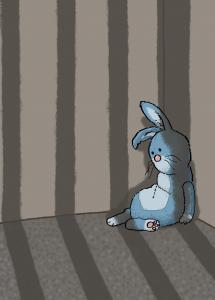
Sara Gray's one woman performance of the play "Jordan" is a tour de force. The play (written by Anna Reynolds with Moira Buffini) is an intimate portrait and true story of Shirley Jones who was tried for the murder of her young son. Both the writing and notably Sara's performance make you care deeply about this young woman looking for excitement in her drab life and finding it by attaching herself to the wrong man. She eventually finds a fulfilment in motherhood that could have enabled her to live happily ever after but the combination of an abusive relationship and fear of someone taking her baby away pushes her into the depths of mental illness.
The play starts with and returns to a fairy story told by a mother to her son which is also an allegory for the life of Shirley and Jordan. The rest of the play tells Shirley's story and paints a vivid picture of the events of her life, her feelings and motivations and the people that she encountered. The detail of the writing and performance has stayed with me. Some examples include the joke of nicknaming the psychiatric wing of the hospital "Fraggle Rock", weighing up whether cancer is preferable to life imprisonment talking to a dead child, deciding that someone must be a visitor to the prison because they smell too nice or the metaphoric comparison with seaside cliffs that can only take so much before they crumble.
This play is profoundly tragic. However the skill of both the writing and the actors performance brings out the humanity of the story. This is ultimately uplifting because you feel that you have made a connection with this woman whose demons are not so different from the rest of us.
There are two further performances of the play on the evenings of the 19th and 21st. I strongly recommend this play for its great writing and superb acting.
Alex Watts
JUST AN ORDINARY LAWYER - Tayo Aluko & Friends
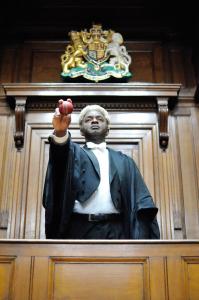
From the writer and star of the highly successful Call Mr Robeson, also at this year's Fringe, Just An Ordinary Lawyer charts the career of Tunji Sowande, Britain's first black judge.
Tayo Aluko inhabits the role with perfect ease in an ambitious, far-reaching show that places Sowande's life in the context of world politics and black history. When Sowande leaves Nigeria to study law in Britain in 1945, conscious that this is also the perfect place to indulge his twin loves of cricket and classical music, he is shocked to be treated with contempt by a senior barrister who advises him to "get on the nearest boat to Bongo-Bongo land". A legal case provides further disillusionment as he realises that the British police are "not as squeaky clean as he had assumed". Yet somehow this dignified character retains a sense of how things should be, his beloved cricket becoming an emblem of fair play as he dreams of its rules one day applying to him and his brothers across the fading British Empire.
This is by Fringe standards a longish show but Aluko commands attention and his revealing and informative monologue is punctuated by perfectly chosen songs ranging from I Wish I Knew How It Would Feel To Be Free to an emotional Yoruba anthem sung at the funeral of Sowande's mother, all performed in his fine baritone voice. Tim Mottershead provides unshowy but expert accompaniment on piano, occasionally joining in the action to pass him his jacket or an imaginary sherry.
We learn more about Sowande's progress through the strata of British society and his charting of civil rights milestones than we do about his personal life but there is something telling about this very absence. Just as he has sacrificed his one-time dream of retiring to his African village drinking palm wine with the other elders, so he must accept that the son he left in Nigeria is now estranged. "I had been offered this life as a gift but I had dropped the simplest of catches", he says in a quietly devastating moment.
For all that, Aluko leaves us with a smile on our faces as we see Sowande finally getting his own back on the British establishment as confident now in society as he is on the cricket pitch.
Stephanie Billen
JUST LIKE THAT! THE TOMMY COOPER SHOW - Hambledon Productions

You have to be brave and talented to take on making and touring a tribute to Tommy Cooper, the comic genius who made us laugh at his bad gags and his (often-failing) magic. His magic was designed to fail, his quick-fire gags, were designed to be groan-worthy, and that’s how and why he held us in his thrall: a consummate performer who knew just how to work, to milk, his audience. His unbreakable self-confidence, his nonsense, his over-the-top laughs with us at himself: that’s what we loved.
It’s also what John Hewer so obviously loves here in this one-man show. He has control of the stage and control of us. He’s got the voice (voices) and the mannerisms – and a fez, just like the man himself. It may not be the same one, just like the duck picking a card or the bottles in the bottle-glass, glass-bottle routine may not be the original props, but that doesn’t matter. He’s got the scripts and the self-confidence to tell bad jokes and to show us cod-magic.
John Hewer has been touring this show extensively since 2014. He’s a scriptwriter and runs script-writing workshops as well: but with material as good as Tommy Cooper’s, the only advice has to be "Don't touch it, it's just fine as it is”.
The Stage newspaper has said “John Hewer captures the Cooper style, from the mumbled speech and loud laughter to the awkward giant-body language”. Quite right. And when you hear that the show has support from the Tommy Cooper Estate, you know you’re in for a show of quick-fire enthusiastic nostalgia. But not just nostalgia - my 15 year old likes Tommy Cooper too.
Michael Quine
KNEES BENT BRAS OFF RA RA RA by Ruth E Cockburn - Ruth E Cockburn

Ruth Cockburn is having a party and we are greeted at the door with cheese and baby onion cocktail sticks, that classic 1994 party snack! It is very apparent that Ruth lives alone, but that isn’t sad and she gives very good reasons why not!
From the very start the audience are involved (Uncle Dave and Cousin Viv, Uncle Alan) and enjoying the banter on their jobs – nurses, teachers and a least one weights and measures inspector; then onto qualifications – own up if you have a degree! This in turn underpins the variety of people who usually visited her childhood home in a B&B in Blackpool. Using a variety of very well written poetry, songs and anecdotes we are treated to a fun filled hour of the characters that made up her family, some real, some adopted and there are some hilarious tales to be told. Dorothy’s schooling on sex education, Auntie Cath’s party games, Uncle Barry (he’s not a racist), daughter Debbie. And the parties vary from Oraflame and Pippa Dee to Tupperware and watching the illuminations but always with great company.
Ruth is very clever with her writing; sometimes sad, sometimes hilarious (the audience behind me were in stitches) but particularly poignant. There is a great deal of affection for these characters and there is an underlying message about choosing your family and who you spend your time with, who you have a cup of tea with – even if you do live alone!
A must-see production, well written, perceptive and thoughtful and very funny!
Sandra J Cooper
LEGALLY BLONDE THE MUSICAL - Mad Hatters Music Youth Group

Legally Blond was performed with verve and enthusiasm by a youthful company of 12 – 21 year olds who rose to and exceeded the challenge of a full-length musical. The show tells the story of Ella Woods, a young Californian girl whose mind is filled with fashion, friends and frivolities. When the love of her life, Warner, announces he is going to Harvard and is dumping her because she is not “serious” or “classy” enough she determines to follow him and get him back. A delightful excuse for an all-singing, all-dancing musical giving a message that it is important to be yourself, that not all men judge a girl by the colour of her hair and that female friendships matter.
Dance set-pieces were well choreographed and slickly performed. The first routine, in which the girls sang of the sacred bond of sisterhood, got the show off to a rousing start ad I am full of admiration for the cast who, after the interval, managed a complicated dance routine which involved skipping with ropes whilst singing!
Annie, playing Elle, showed she can sing beautifully, dance and act. Annie commanded the stage and has the ability to change the mood with a song, with a word or with a facial expression. It is not always easy to develop a character in a musical but Annie managed to make Elle a very real person who the audience cared about. An excellent performance – well done.
Other main parts were also strongly cast. Matt, playing Emmet and Jude, playing Warner were alongside Elle as she made her journey of self-discovery. As Emmet become more confident, Warner’s charisma faded. Both actors conveyed this switch well; Matt as the initially hesitant lovelorn Emmet and Jude as the initially cool and confident Warner.
Elle’s four female friends, Paulette, the hairdresser, Enid strident about women’s fights, Brooke the fitness instructor and Vivienne the smug Ivy Leaguer were very well portrayed by Caitlin, Elyse, Sophie and Anna. It would have been easy to slip into caricature but all four portrayed these woman with understanding and fondness. They all seemed to like the characters they were sitting in. I reviewed both Elyse and Anna in productions last year and am delighted that they continue to develop their skills as actors.
It is difficult to pick out any one of the song and dance routines for special mention but for me the prize goes to “Is He Gay or European?”………. Charlie, as Carlos, played the perfect cameo outraged Spanish boyfriend. Super timing and super accent. In fact all the American accents were good. With accents as well as with characterisation, Clare O’Neill, the director, made sure the cast did not overdo things. There were gentle hints of American accents rather than strident attempts to sound like Californians!
Special mention must also go to the effective set design. Minimalist use of scenery and placement of cast effectively conveyed settings ranging from a hairdressers, through messy bedroom to a courtroom. The sets and props had been very well thought out. Thanks also to the musicians. Not only did I enjoy the live music as an audience member, it was also an added experience for the cast to sing accompanied by real musicians.
This full-length production did not just “happen”; it is the final product of months of hard work by the actors and by the adults who support the group. As with the junior group there are two different casts to enable a greater number of youngsters to sing solos. I am sure the cast I did not see will be just as good. So, well done everyone - maybe this production will transfer to the Opera House ...
Viv Marriott
LOOKING AT LIFE - TWO SHORT COMIC PLAYS - Magdalen Theatre

The show was introduced by a couple of witty poems written and performed by Tim Leichtfried. He has a gift for language and the reviewer looks forward to hearing more, although maybe less focussed on functions of the rear lower body!
The first playlet, ‘Cat’s Eye View’, written by Joyce Janes was on a similar theme to the children’s book ‘Six Dinner Sid’, the story of a cupboard-lover cat roving around in search of a free meal and being known by different names by its various feeders. Thomas the cat was played out gently and amusingly by Anne Shimwell and competently supported by the cast. Joyce has created a lovely little performance for children to act or watch but its billing seemed a little at odds with its ‘18+’ companion piece.
‘Argy Bargy’, the second play, came across as the more serious feature of the evening. Mary Hennessy wrote and directed the piece, setting herself the enormously difficult task of writing in the mode of young men chilling and chatting. And she pulled it off convincingly well.
Mary clearly has highly-tuned observation and the ability to translate this into thoughtful dramatic work. The acting by Matt Bowers as the slightly feckless Al and Tyler Spencer as the more street-wise Billy was near flawless; the way they played off each other was a joy to watch and their pace and timing was appropriately snappy. And then Tim Leichtfried as Joey entered the show and took it up yet another notch, causing the audience to reflect not only on the plot but, to a degree, on themselves. A well-executed, engaging and clever morality tale; very much in the spirit of our times.
Jim Marriott
MEN CHASE WOMEN CHOOSE - People Zoo Productions

Over the years at Buxton Fringe we’ve seen notable examples of that particular comedic sub-species, the Science Comedian – from Helen Keen to Helen Arney to Matt Pritchard, there have been comedy shows that stretch the audience’s learning as well as amusing and entertaining.
To some extent, Men Chase Women Choose, from People Zoo Productions, falls into that camp. Two women – Sophie Giddens and Eve Shotton – one an earnest scientist, one an excitable actor, take to the stage for a history of how women’s sexuality has been viewed through philosophy, science and psychology, and how these external views have shaped how women view themselves, as well as how society sees them. From the ancients believing that the womb wandered around the body bringing on bouts of ‘hysteria’ to the idea that women’s menstrual cycles will sync up if they live in close contact, ideas are discussed and debunked. This is a fantastically well researched piece.
It is also very funny. Giddens and Shotton play off each other brilliantly, their onstage characters extremely well realised. They also indulge in bouts of absurd physicality – both on stage and on film – that remind one of a more bawdy Kagools.
But what sets Men Chase Women Choose apart is that while, in the quest to find laughs, it could have been glib, this is a show that is also heartfelt in its call for women to become empowered in their own sexuality and not be dictated to by external forces. Indeed this is a show, that, were it not for its ruder moments, would make required viewing for teenage girls (or boys for that matter). It is thoughtful, impassioned and quite brilliant.
Robbie Carnegie
MOBY DICK - Grist To The Mill Productions Ltd

This new adaptation of Herman Melville’s classic novel about Capt Ahab’s doomed chase to get his revenge on the great white whale is both epic and intimate.
Ross Ericson has taken the original novel, retaining much of the text and the style of the writing and presents it in a series of scenes, sometimes as Ahab bellowing at the crew to pull harder on their oars, sometimes as Ishmael the narrator sitting quietly and reflectively, recalling how he came to be sailing on the ship in the first place; introducing the characters one by one and showing how their friendships developed and were tested in the face of Ahab’s obsessive search for the whale which had taken his leg on a previous whaling voyage.
Ericson, in a very strong solo performance, jumps forward and back in time, but the narrative drives ever onward, with gentle moments in the bar in Nantucket where, searching for a way to put some meaning into his life, he manages to miss the boat to take him to the whaling community of Nantucket, thus meeting Queequeg, to energetic and evocative descriptions of the chase itself and that great whale.
There’s a chair on stage, there's a suggestion of the ship Pequod’s sail to suggest the nautical context, but no fussing with props or complicated sound effects. The excitement, the drama, the near misses, the eventual success – all these are conveyed by Ericson's strong performance throughout. Assuming, that is, that it can be success when Ahab and the whale and the rest of the crew all perish, leaving just the narrator Ishmael to survive.
The Grist to the Mill company was formed in 2012. Its shows have been winning awards since then – most notably "The Unknown Soldier" with a collection of 4-star and 5-star awards: this new show, premiering here in Buxton, seems likely to follow. It’s compelling theatre, and the adaptation really brings Melville’s words to life.
Michael Quine
MONKEY AND THE WHITE BONE DEMON - Red Dragonfly Productions

Based on a classic Chinese story the tale follows the three Buddhist monks Monkey, Pigsy, Sandy and their master Tripitaka and their journey west to India. The monks must protect their master using all the skills and knowledge they have, as their journey is long, desolate and fraught with danger from a devilish demon who wants to take Tripitaka to her lair to devour him and become immortal.
The wonderfully diverse mixed British cast from Red Dragonfly Productions’ cover of this Chinese classic deserved to have an audience larger than four, and had to fight a few first night demons of their own to overcome, with a few technical issues and a couple of first night jitters. This did not however detract from the excellent storytelling by the cast who gave their all to their first performance of the piece.
Within the show the four protagonists are like a dysfunctional family, constantly arguing and nobody getting along, and yet somehow are always there for each other. Each has their own unique characteristics that adds to the group environment, and play off each other very well throughout.
Monkey, played by Victor Itang, is the clear leader of the group, suspicious of everything and always on guard, possibly overly-so to some of the group. The characterisation of Monkey by Victor was excellent, clearly showing some animalistic style of movement to increase the fantasy element was a nice touch. Pigsy, played by Writer and Director Ross Ericson, is the light hearted comic relief of the show, with his eyes constantly wandering in search of food in a never-ending quest to become full. Ross played the part effortlessly naturally and with excellent comedic timing throughout, making Pigsy one of the most relatable characters in the production. Sandy, played by Sunjay Midda, brings balance to the group, never wanting anyone to fall out and always available to offer advice or help, no matter how it’s greeted. Sunjay did well to add an occasional internal conflict on what the right thing to do at certain times during the production, and stayed well in character throughout. Tripitaka, played by Allan Law, is the inspirational leader of the group, one who all the monks following him look up to and respect deeply. Allan brought a sense of calm to a frantic and at times chaotic group, although on occasions his vocals became a little lost, he did well to maintain the authority figure throughout. Lady White Bone aka the White Bone Demon, played by Michelle Lee, is the stereotypical ‘baddie’ who wants to right the wrongs in her life and is willing to do anything to do so. Michelle created a wonderful aura around the character giving her a sinister, but relatable feeling. Having to multi-role on multiple occasions, with a couple of quick costume changes was a good quality to see. Of a worthy additional note are the three Spider Sisters, who were excellent throughout the production, adding a “hyena from Disney’s The Lion King” style charm to the show.
This is the perfect show to go and see if you want to see something that little bit different during the fringe. Imagine if you will a light pantomime set in China; plenty of drama, big characters, laughs, stage combat, a clear definition of good vs evil with a dose of morality thrown in for good measure. A show of magic, mystery, mayhem and mischievousness, the production would be well suited for audiences young and old with enough content to keep children entertained and double entendre for adults to chuckle alongside to.
They are performing the show again on 6th and 8th July at the Rotunda Theatre.
Tony Owens
MULAN - Grist To The Mill Productions Ltd

Whether it is true or not, the story of Mulan is a powerful one about a woman who chooses to go against tradition and fight in place of her father. This production has nothing to do with the Disney film and seeks to tell us the story (one of the versions) while opening the way to our own reflections on male – female roles and relationships.
We are told about Mulan sitting at the loom in her country village when the authorities call on all the men in her village to sign up for the army in order to defend China, somewhere around the fifth century. Her brother is too young to go, her father willing enough but too old and ill. So Mulan sets out secretly, soon takes on mens’ wear, and joins the troops.
This is a monologue, delivered in 4 ‘scenes’ by Michelle Yim, written and directed by Ross Ericson. We see and hear her marching along with the other (raw) recruits, waiting bored and in real trepidation for the battle to come, terrified when the enemy charges but then gathering her courage and becoming a ferocious fighter. And continuing as a soldier, sticking with it till she eventually retires – as a general – to her quiet village to live on in retirement, back as a woman.
This is billed as “the real story” of Mulan. Who knows? It doesn’t matter. What matters is that this is a stirring narrative, one which makes us reflect on wider themes. There’s not a lot of action, though the march – run – charge into battle is particularly convincing.
This was the first performance of a new show headed to Edinburgh, and there will inevitably be some development before it gets there. In this performance it felt a little rushed, as if the character was telling us a tale she’s told so many times before rather than pacing it to reflect on what it was she was saying, remembering, and how we the audience would be receiving it.
Michael Quine
THE NEAT FREAK - Moon House Theatre

The Neat Freak, a short play, takes a look at OCD and its effect on the lead character and on those she meets – through school & college particularly, and on her parents as they come to realise what’s driving her strange behaviour. Her school friends call her a freak': her parents, watching her obsessive way with book shelves (lining the books up first this way then that, again and again) label her ‘neat’. She tells us about how she grew into compulsive cleaning, obsession with germs and the need to wash everything three times - and then again: how that fear for herself just takes over everything she does, then turns into the fear that she will harm someone else by passing on dirt and germs to them, a fear which relentlessly multiplies. We hear about how early driving lessons led into a refusal to continue, again for the risk of hurting someone. We hear about the doctor’s diagnosis: about an attempted suicide: about how the internal voices reflecting it all driving her on eventually fall away …
It’s predominantly a monologue delivered at us by Ellen Lawson looking at us but never engaging with us as audience. She is accompanied on stage by four others, rarely speaking: a kind of Chorus, reflecting and reflecting on what she is saying: representing those internal voices. When they fall away we hear about some kind of peace of mind, of acceptance. Not a cure, but recognition at least.
The team are graduates from Bath Spa University and the show has been seen at the Edinburgh Fringe. Written and directed by Charlie Henderson-Howat, it tells everything from the point of view of the one person: the chorus is there simply to add weight to her thoughts.
There’s been a handful of plays of late explicitly addressing mental illness and the ways that it can affect individuals and those around them: aiming to offer audiences knowledge, understanding and appreciation along with, usually, a good dose of humour and stagecraft.
Michael Quine
OLD BONES by Jen McGregor - Third Pier Theatre
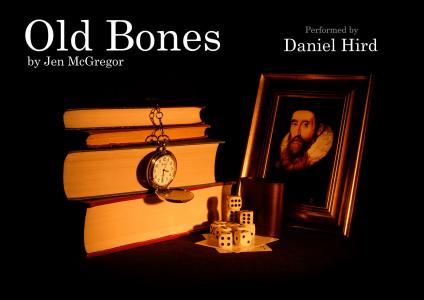
Performed by Daniel Hird, Old Bones was an engaging and captivating show. Daniel's inspiring confidence and the way he quite obviously felt so at ease with the show and being on stage made his performance a very enjoyable one to watch. The show itself was thought-provoking and curious. For the whole hour-long performance I felt so captivated by his storytelling and passion. Hird's talent for bringing the story to life shone through and his excellent use of sleight of hand in the dice and card tricks made the performance a joy.
Exploring an interesting concept of a game of cards with the devil - with immortality as the prize - the play required various members of the audience to participate and play different characters, which they did willingly. Hird's performance was versatile, with moments of vibrant humour contrasting with darker elements revealing the character's heartbreak and struggles.
I would definitely recommend this show to anyone who enjoys excellent acting and perfectly engaging story lines!
Alice Featherstone
ONCE UPON A TIME IN TRIESTE - Silver Pine Productions
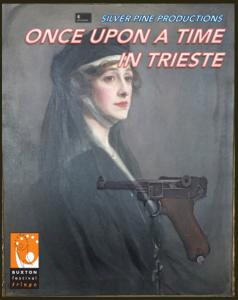
A woman sits on a chair. She holds her rosary beads in her hands and she is repeating her prayers. She is elegantly and stylishly dressed. She is something out of the 19th century.
There is something of a commotion nearby and a man bursts into the room. He stumbles, breathless. His clothes are worn and those of a labourer. His boots are heavy and coarse. He carries a shoddy canvas satchel-like bag. He has the looks of someone from the early 20th century.
And so it is. She is Princess Charlotte of Belgium. For her it is Wednesday 18th September 1867. She is married to Maximilian I of México. She is waiting for his return. But she will never see him again.
He is Pavel ‘Pinko’ Radic. A Slovene and a member of TIGR - an anti- fascist organisation. For him it is Saturday 18th September 1938 and he has escaped from a failed attempt on the life of Benito Mussolini.
They are in a room in a castle in Trieste. A city in Austria or Italy. Depending on which century you are in.
The two of them spend 90 minutes talking, arguing, playing, trying to work out what is going on in their lives and the wider world.
This is the background for this excellent play which is presented in the small workshop room in the Green Man Gallery, set out with chairs on three sides so that you are never more than a couple of feet from the actors. Sarah Gordon (Charlotte) is by turns aristocratic, curious, confused, angry and panic-stricken. Pinko (Carl Bownas) is proud, defiant, challenging, frustrated and broken.
Writer Anna Girolami gives the actors an excellent script. Witty, intelligent and energetic. Simon Corble directs with economy and purpose. This play may not be seen again. If you can get a ticket for the final performance in Buxton then do. This thoroughly engaging production is not to be missed.
Keith Savage
THE POWER BEHIND THE CRONE - Hint of Lime Productions
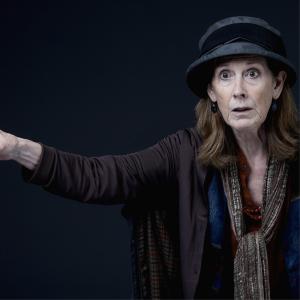
This is an actor’s and a drama teacher’s dream: the opportunity to play extracts from seven women's parts from different Shakespeare plays, and to talk about them, explaining, describing, discussing context, character, text style and more besides. But it’s far from being a dry lecture – Alison Skilbeck creates the overarching conceit of a Professor, member of a U3A group, who is dropped in to the task when a colleague, an internationally respected academic, drops out of the event (“As she so often does”), leaving our performer (as Prof Artemis Turret) to run the whole evening. The character is an academic, not an actor, though as the explains to the group she’s long harboured the desire to perform - and here's her opportunity.
Standing in, she has to make excuses, address individual members of the Group from time to time (she knows them all, their foibles, their hearing aids), to stop the tea trolley from being brought in – interventions which draw inevitable memories of Joyce Grenfell’s performances.
Directed by Tim Hardy, Skilbeck covers a great deal of ground, from the earliest of Shakespeare’s plays (Henry IV Part 2) through to The Winter’s Tale, and shows with constant energy and enthusiasm just how Shakespeare created and developed a range quality parts for older women characters.
It’s performed with full-blooded enthusiasm and leaves us better informed about the characters and Shakespeare’s writing, and in awe of a performer who can so successfully move through so many parts with such apparent ease, plainly enthusiastic both in role (all of the roles) and in the script she wrote.
Michael Quine
RAREST OF ALL RARITIES - PB Theatricals
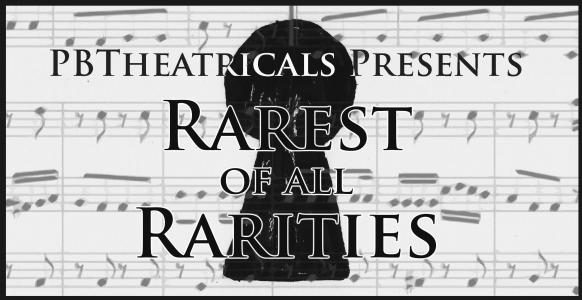
Ahead of Buxton Opera House’s Gilbert and Sullivan Festival (24-29 July) this outstanding fresh approach by PB Theatricals youth company certainly got us in the mood.
Do not let the ages of the Company members lull you into thinking this an amateur performance, this was extremely accomplished. We enjoyed excellent vocals and harmonies from Michael Beale, Jamie Benson, Lou-Anne Binns, Liddy Buswell, Emily Callow, Sophie Cooke, Oliver Jennings, Seb Stone and George Taylor, along with Chris Flint on keyboards.
Making the most of the great acoustics within the Green Man Gallery this was billed as ‘The Rarest of all Rarities’, aka a selection of Gilbert and Sullivan songs that you might not be so familiar with. This however did not matter as we were given an entertaining introduction to each piece.
We heard ‘Climbing over Rocky Mountain’ from The Gods Grown Old, ‘Eagle High’ from Utopia Ltd, ‘Now to a Banquet we Press’ from The Sorcerer, an hilarious sausage roll song (including appropriate props), and the most beautiful female duet from The Grand Duke, which brought a tear to my eye. Surely we were in the presence of our opera stars of the future.
This was fantastic from start to finish, with fun choreography (watch out for an excellent maracas and tambourine routine), and a thoroughly rousing performance that had plenty of foot tapping within the audience.
You do not need to be a hard-core opera fan to enjoy this event. After all, Gilbert and Sullivan’s satire written in the late 1800’s has stood the test of time and is accessible to all, with comedic lyrics and uplifting melodies.
Do not miss the final performance at 3.00 pm, 19 July 2019, held in the Rotunda
Karen Wain-Pimlott
REVELATION 1:18 - Sudden Impulse Theatre Company

The award-winning theatre company presents Jack West’s Revelation 1:18. In a time of mass produced, generic pop music, a young up and coming band awake in their flat in their hometown after a series of exclusive parties following the release of their debut single. The band then face something of an identity crisis when a review in a magazine divides their opinions on what they stand for and what it is that they can achieve.
This roller coaster of a production begins life harmlessly enough, with some good humour between Craig and Quigley (Sam King
Ollie Topp respectively). Think a modern day, more intellectual ‘Young Ones’ based around music and lifestyle, with more swearing, but takes a quick sharp left turn once Rob (Bridie Vowles) reveals her thoughts about the review in a magazine that has her seething, and the boys soon find out exactly why.
The two male characters work very well together, with some superb comedic timing and rhythm throughout and come across as either lifelong friends or even as brothers they seem that close.
Rob is very serious about her views on the whole situation and is adamant that she is right and thinks very laterally on her reasoning behind what she believes the group must do in order to achieve exactly what they want to. Some good solid performances throughout by all members of the cast, who managed to control the flow of the piece excellently.
The play itself won’t be for all; the language is foul and harsh throughout but in itself that sets the tone for the piece, as it gradually gets darker until the ‘Revelation’ of just how far this band might go to secure their legacy. The play asks more of an audience than that though. The 3 characters could be argued to be an inner monologue most people have with themselves, especially over big decisions or at key moments in life. One serious, clear decision-making thought line that others would see as probably far out there (Rob); One calm and optimistic that wants to see the best in a situation (Craig); One in-between the two, easily led and sees both sides as right and causes inner turmoil (Quigley).
The play is a dark comedy that touches on creative authenticity and leaving a legacy, but asks a bigger question from us all on what are we willing to put ourselves through to achieve our goals and how a mindset can be changed.
The production is on at the Old Clubhouse on 15th, 18th & 19th July (2.30pm – 3.30pm) and 20th July (1pm – 2pm)
Tony Owens
THE RIOT ACT - Breathe Out Theatre
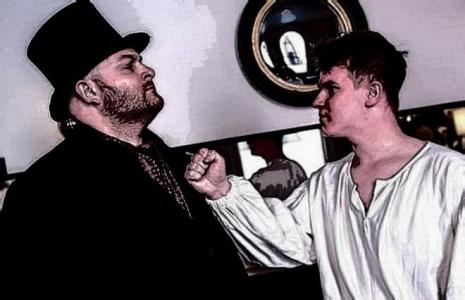
This is a persuasive and successful piece of history, beautifully written and drawing out the dilemmas around the cotton-mill industry. The Preston Riot of 1842 is less well known than the earlier Peterloo Massacre (only 4 shot and killed in Preston!) but the context and background are similar. Mill owners wanted to defend their profits: cotton-workers had legitimate grievances.
Rob Johnston’s fine script tells the story through two alternate pairs of men. A weaver, so aggrieved that he is set to fight if the conflict develops; and a machine engineer who argues against physical action (“the army is standing by – we’ll never win"). And a pair of top-hatted mill owners, one – the older generation – who is also the Mayor of Preston, and the other from the newer younger generation. The Mayor, of course, has the right to read the Riot Act so as to force crowds of angry mill workers to disperse. And, of course, to protect his mill and his profits, he does, and that brings in the army.
In each coupling, the characters have opposing views. The two actors, Jake Talbot and Christopher Ward, are physically different from each other, one small and lithe, the other much heavier and bulkier, and this physical difference is used to excellent advantage in the emotional debates in successive scenes.
The show is very far from a dry history lesson. There’s a good deal of humour in the script and the different positions are put persuasively by two very strong actors confident in their ability to fight their case with voice as well as ideas.
And of course it’s easy to see – though it isn't a point made explicitly - the parallels to today: on the one hand, workers with poor living conditions and little money, little security, on the other rich industrial concerns which continually bring new machinery which reduce the need for workers.
The production has a clear momentum, it's beautifully paced, it never drags, and it ends with emotion as the two actors face the audience, instead of each other, and round off the facts for us. It’s a very small space and the show works well within it. Breathe Out Theatre company should be proud of it: it well deserves its funding from the Arts Council.
Michael Quine
RUBY & CEDAR - Fishhouse Theatre

Ruby and Cedar tells the story of two siblings, played by Therese Collins and Blue Merrick. Ostensibly set in a garden somewhere in the West Midlands, this is a multi-layered play that unfolds through the performance. The play starts in the sisters’ childhood, and Collins and Merrick wonderfully evoke the magic and wonder of childhood imagination as the sisters carry out repeated Moon landings. Gradually the differences between the two sisters become clear, but the bond between them remains strong. The tale of the two sisters is interspersed with two separate stories of Russian cosmonauts. I was delighted to find out about the first woman in space, Valentina Tereshkova, who orbited the Earth 48 times. How you react to that fact will determine which sister you most identify with.
Collins and Merrick play all the characters, and as all the Russian women are called Valentina you have to pay attention, but the characterisation is skilfully done. Merrick in particular swaps adeptly between being her childhood self and her mother, creating an illusion of the whole family being on stage. As with the sisters, the contrasting characters and friendship of the Russian cosmonauts Komarov and Gagarin are beautifully portrayed in actions and dialogue. This play deals with universal themes of courage, love and loss, in space and on Earth.
This play is Fishhouse Theatre’s third time in Buxton, and the first with Arts Council Funding. This has allowed the play to have more set than most Fringe productions, and Collins and Merrick make the most of it, weaving a dramatic spell which turns two reclining garden chairs into the family sofa, seats in a space rocket and the side of a lander. Skilful lighting also helps differentiate between the different scenes. I particularly liked the moment when the young sisters watched the Moon landing at 3am on 20 July 1969, with the television light spilling into the room.
Writer and producer Alison Dunne says she wanted to tell the female side of the story of the two cosmonauts in Soyuz 1. Fishhouse Theatre is an all-female company and seeks to promote employment opportunities for older women in theatre. Ruby and Cedar had two successful performances in the Arena Theatre in Nottingham in June and will be touring with Live and Local in 2020.
Don’t miss the opportunity to see it now at the Lee Wood Hotel at 2.30–3.40pm and 7.00–8.10pm on Saturday 19 July and 2.30–3.40pm and 7.30–8.40pm on Sunday 20 July.
Georgina Blair
SHE WOLF - Gillian English
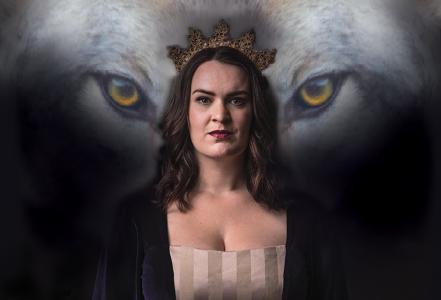
Gillian English seeks to give us the truth about Queen Margaret of Anjou, heroine of four of Shakespeare’s plays. “Who?” I hear you ask. And that is exactly the point that Gillian is making. Shakespeare’s women were two dimensional characters, he peddled male propaganda about women and nothing much has changed in nearly 500 years; only 7% of world leaders being women.
Queen Margaret greets the audience at the entrance to Poole’s Cavern with the question, “Which is your favourite Shakespeare play?” “Romeo and Juliet,” “Huh, that simpering young girl.” “Taming of the Shrew”, and Queen Margaret is even more dismissive of Kate. As she invites us to follow her into The Cavern, Queen Margaret explains that she has clawed her way out of hell, arriving at Poole’s Cavern, to tell her true story. And boy does she tell it like it is. The twenty first century Margaret is actually, in reality, a feisty, fearless, fast talking Canadian.
This piece of theatre is structured around speeches from the plays in which Queen Margaret appears; Henry VI, parts 1 and 3 and Richard III. As we follow Queen Margaret deeper into The Cavern we learn about her life. We first see Margaret as a simpering 15-year-old, excited to be marrying a king. She has one job to do; produce an heir and in today’s language she explains exactly why this was problematical. We met her again after the deaths of York and her son Edward and finally at the end of Richard III when she had a very bitchy conversation with the Duchess of York. Queen Margaret concedes that Shakespeare gave her a more eloquent speech on the death of her son than she managed herself. However she is absolutely furious at the liberties taken by Shakespeare, such as putting her on the battlefield when, in reality, she was hidden away in churches making up sins with which to shock the priests just to amuse herself.
Gillian English has done her research well and has great sympathy for Queen Margaret. She is often portrayed as evil and overly ambitious but Gillian sees her as a woman who had good intentions but made bad choices. We all have choices to make and sometimes not the correct ones. Gillian set out to write a serious play but found that the comic voice broke through. The audience warmed to this lady who had done all the preparation for her job interview as Ruler of England, written her resume, had an excellent CV, read the rule book, and was obviously the best candidate but had failed to notice the requirement on the back page – men only. Gillian performs this character with gusto, rollicking through scenarios that resonate for women of today.
The setting of Poole’s Cavern enhances the experience giving Queen Margaret the opportunity to clamber up to rocks to deliver one of her speeches and to point out the exact spot where she had crawled out of hell.
As well as being amusing, this play may make audiences question if attitudes towards women have really changed over the last 500 years. Plenty more opportunities to go along to Poole’s Cavern and meet the indomitable Queen Margaret of Anjou.
Viv Marriott
SIR HENRY IRVING AND THE BELLS - Stage Three
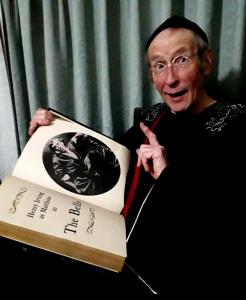
With his play "Sir Henry Irving and The Bells", Mike Brown takes the audience into the world of Victorian theatre which was a very different place from today's theatrical performances. Multiple plays were performed in the same evening and the programme could run for several hours. Mike's play cleverly combines the life story of Henry Irving and a performance of his most famous work The Bells.
Irving's career got off to an inauspicious start and his performances were over the top but he understood what nineteenth century theatre goers wanted and thought nothing of cutting hundred's of lines and adding special effects and melodrama to jazz up the theatre experience. He made a star of Ellen Terry, was patronised by Oscar Wilde and managed by Bram Stoker.
Mike's funny and entertaining performance brings Irving and the other characters to life and packs a lot into the hour. You learn about the lives of Irving and his contemporaries and what Victorian theatre was like as well as enjoying key scenes from The Bells itself. It is a great show for theatre lovers and for those who enjoy a bit of history and a good laugh.
Alex Watts
SOAPBOX RACER - Ben Schwarz

Soapbox Racer, written by Ben Schwarz and performed by Grace Cordell, is a coming-of-age story, a tale of a young girl stepping out from feeling the need to be noticed by a boy, and instead finding herself, as well as true friendship and a closeness to her father she had thought lost.
Cordell plays Kay, determined to take part in a soapbox derby in order to gain the attention of her ex-boyfriend, Rory, and win him back from her former friend, Vicky. Cordell’s Kay is such a well realised character, and she captures the gauche enthusiasms of teenager-hood, physically and vocally, in a lovely, assured performance. Ben Schwarz’s script, while not exactly treading new ground in terms of its plot, has a great ear for teenage girl speech, and the rituals of adolescence, without employing so much slang as to confuse an older audience. Louise Sanfey’s direction is clean and crisp, allowing Cordell to shine, while adding variation to the monologue form.
It’s a simple tale, heart-warming and affectionate, and one can’t help but be drawn into Kay’s world, and charmed by this spiky, vulnerable and funny young woman.
Robbie Carnegie
SPECIAL MEASURES - Blackboard Theatre
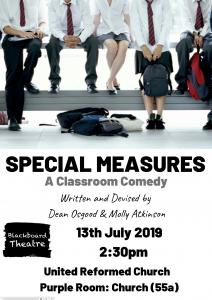
This play, written and performed by Dean A Osgood and Molly Atkinson, bills itself as a classroom comedy, but it’s really despatches from an embattled front line. Osgood and Atkinson, both former teachers, draw from their own experiences to give the audience an authentic view into life in our classrooms today.
The performance starts with Osgood and Atkinson whispering to each other nervously at the back of the hall, but as they walk up to the stage Atkinson gives a convincing performance as the determinedly upbeat teacher preparing to engage an assembly of recalcitrant school leavers (the audience). This confident facade fades as Osgood and Atkinson agree to show us what teaching was really like, and Atkinson relives her days as Alex, a newly-qualified drama teacher at a large secondary academy somewhere in the north of England.
Osgood and Atkinson play a large number of characters between them, from teaching staff and students to the school business manager, often swapping rapidly between them. This was sometimes confusing, but the characters were clearly drawn and scenes from Alex’s classroom were brought to life. Student behaviour was challenging, and parental input unhelpful, but it becomes clear that these were not the most difficult things Alex had to deal with at the school. The delicate rapport that Alex built with the school bully through drama class was touching, making the deputy head’s admonition not to bother with the boy, as his parents didn’t amount to anything and neither would he, even more shocking.
The play makes frequent reference to the terminology and target setting used in the modern education system. This was delivered at a rapid pace, which was hard to keep up with for those not in education, but perfectly demonstrated how far education has swung towards business-style metrics and measurement.
This is an important insight into a world not seen outside of the teaching profession unless you are a school age child or parent of one. I overhead an audience member saying at the end of the play “things have changed a lot since I was teaching”.
To see this play you’ll have to go to Edinburgh, where Osgood and Atkinson will be playing the Fringe from 19th to 24th August.
Georgina Blair
A SUBSTITUTE FOR LIFE - Hint of Lime Productions
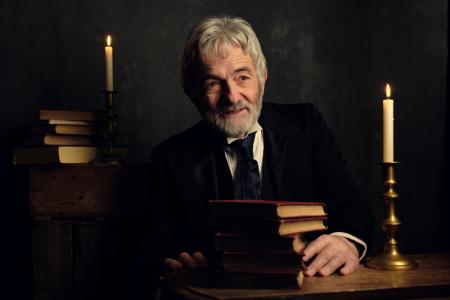
This is magnificent, an excellent piece of theatre, and it’s such a pity that it hasn't a longer run in Buxton.
Tim Hardy is admirable as Francis Kenworthy, younger and almost disregarded son of his strict, even harsh, Victorian father. Now, whiskered in his later years, wrapped up in his books, hiding from / uninterested in the real world, retreating into Robert Louis Stevenson - not always with approval, digging in to his favourite Wilkie Collins novel to quote relevant text to us as he describes his young life, the harsh way he was treated by father and nanny, the late distasteful discovery of sex and .... To say more would be to give away too much.
Hardy is truly excellent, sitting there calmly behind the desk in his library, surrounded by his books and his memories. It’s compelling to watch. It’s as if everything he says is being dredged up from his memory for the first time: the immaculate pacing of his delivery; the occasional emulation of his father, nurse, (briefly) social-climbing mother-in-law; every twitch of his face, every little movement or gesture is a joy to watch. It’s such a pleasure to watch and share his self-awareness as it grows calmly towards an unexpected non-violent end.
Simon Brett, who wrote it, has a long record of witty scripts (often but not all crime-related), on radio, television and film, and won the Crime Writers’ Association Award a few years ago. He knows well how to build expectations, to confound them, to twist the tale. But to call this a crime story would not be appropriate. It’s more a revelation of character, creating a slow-build towards what turns out to be the inevitable tragedy which closes it.
The team is completed by Alison Skilbeck who directed with such attention to detail, drawing out the slow-burn and allowing the audience time to take in the unforgiving nature of Francis’ upbringing, to savour everything he says, to reflect with him as he recalls experiences and to recognise the quality of Brett’s script. We recognise the context and the characters with a smile of recognition and we lean forward in anticipation of more.
Michael Quine
THE SUITCASE, THE BEGGAR & THE WIND - Gare Du Nord Theatre
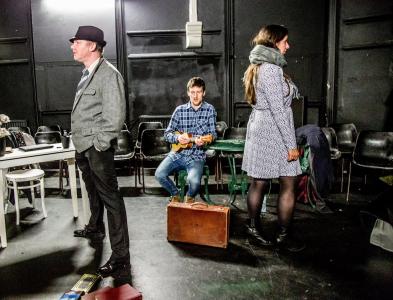
This 5-hander had a previous outing a year or two ago at the Greater Manchester Fringe where they played it in a station waiting room. Here in Buxton we were in a church hall, but the wooden panelling, the style of the windows, and the ‘on stage’ door left half open for us, along with general background bustle tempted us to recall that famous waiting room in Carnforth with its trains passing by. And yes, we could go in there for a mug of tea.
The play itself is set on one of the platforms. There’s one character just sitting there, gently playing his guitar and sometimes singing to himself. That’s the beggar, though he does no begging and indeed when offered some money says “is that all?".
One character – none has a name - crosses several times, each time carrying something different and in a way excuses himself with “I'm just passing by". A couple arrive, slightly awkward husband and wife, he aggrieved and complaining because he has to carry a very heavy suitcase for her. "What on earth have you got in this?” Then a repeated “Do you love me?” sends him to go to sit on the bench, while she gets into conversation with a new arrival, and this re-shaped couple dream and make plans for a new future. Station bell indicates and beggar announces, ‘closing time'; and the initial couple re-form along with their little grievances and set off.
A little later, a similar couple (re)-appear, roles reversed, and a similar scene is played.
There’s a good deal of overheard dreaming about what the future might hold, where it is. The beggar sits there in the background, anchoring us to the present.
That “just passing by" meme is carried through much of the play which is at times whimsical and absurdist, using stylised language as if to distance their thoughts about the future from the reality of the present day in which they meet.
This was a totally full audience, with just a little involvement as some in the front were invited to hold on to items, totems, to represent – well, something. A clock, a barometer, bunches of roses, all tied to themes reflected as the show moves on.
Michael Quine
TAKING FLIGHT SHOWCASE - Red Dragonfly Productions

The pieces are all linked around family. Little Potatoes (written by Clare Reddaway) shows how the harsh reality of family planning under the one baby rule caused heartbreak for those involved. A Piece of Cake (Written by Harri Dhillon) is a caricature driven piece filled with melodramatic events and over the top characters. Aiko (written by Jenny Stark) sees three generations of women coping with the changes that time brings to relationships and the world around them.
The cast, Ainsleigh Barber, Michelle Wen Lee, Sunjay Midda, Harriet Sharmini Smithers, Ellis J. Wells, Michelle Yim are capable and versatile actors, some playing a range of diverse roles. Michelle Wen Lee particularly impressed with her portrayal of a grandmother deemed unsafe to live in her own home.
It is good to see a show like this at the Fringe. Well done to all involved.
Jayne Marling
TANGLETREE - JDJB and TLBB Productions
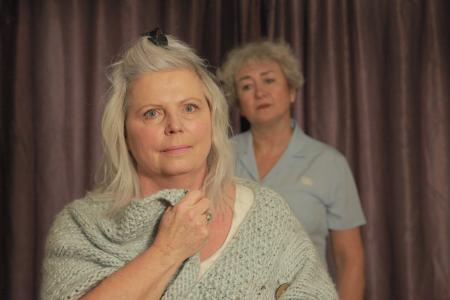
Crash! Within the first 10 seconds I’m engaged in the piece. It opens with the character of Hazel saying “Am I dead?” after being in a car accident. We later discover this is not the case, but the truth is just, if not more, terrifying.
Jayne Connell’s portrayal of student Hazel is believable and highly emotive and the relationship shown throughout the play between Hazel and her mother Ivy (Jasmine Darke) is beautiful and realistic and will resonate with anyone who knows the struggle of parenting and growing up.
This piece was written based on research done into traumatic brain injuries and honestly shows the awful truth of the struggle for the family and the injured person, best described through Ivy’s cry “Who’s stolen my daughter”. Jasmine Darke plays multiple characters and the transitions between them are smooth with each having different characteristics making it easy to differentiate between them. The set is simple yet perfect as the transparent sheet between two chalkboards separates Hazel from the present and allows the audience to get a better understanding of the despair felt by Hazel and those in her situation.
The introductory music by T-Rex and the cultural references firmly place the piece in the 1970s but perhaps setting it in the modern day would resonate with a wider audience. However, I couldn’t keep my eyes off it; Tangletree is a stunning, thought-provoking piece of theatre that moved the audience. It truly is a tale of despair, hope and triumph. Very well done ladies.
Anna Walker
TOM JONES - Red Dragonfly Productions
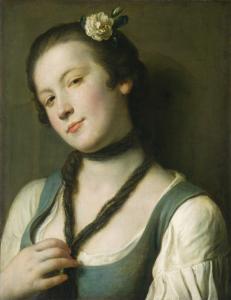
Fielding’s broad epic novel covers a lot of territory so it is interesting to see how this can be staged in the intimate space of the Rotunda. The play’s sub-title is “All the Girls Love a Bastard” and we are promised a ‘bawdy’ production “with all the high French and Italian seasoning of sex and vice”. All this in demure old Buxton, Ooh err...
It is possible to see the foundling, Tom, as an innocent victim of circumstance, being knocked about by events and the lusts of women who find him irresistible. However, he is a willing victim; professing his love for Sophia but succumbing to whatever amorous adventure comes his way without too much protest.
This adaptation by Ross Ericson (who, like the rest of the cast plays multiple parts) uses a narrator (the author Henry Fielding) to move the play along. This means that several of Tom’s adventures, which can feel a little repetitive in the novel, are seamlessly omitted without losing the thrust of the story while maintaining a fast pace. Some scenes can feel a little ‘wordy’, as the style of the times but a nice trick in a couple of the more farcical scenes has the narrator sitting apart from the action but being puzzled and bemused by the door slamming, comings and goings and confusion all around him.
Some of the co-incidences stretch credibility but the scenes during the narrative are leavened by almost slapstick humour – the drinking scenes for example. And, there are lots of ‘Muff’ jokes.
The play is longish for a fringe production – two hours- with a 15 minute break but the energetic cast ensure that the time passes very quickly and entertainingly. It’s an event where you can have a good time and feel gratified at having enjoyed one of English Literature’s great classics.
There are two more performances: 5th July at 15:00, and 7th July at 14:00 – but note from the programme’s door policy: “Whores, Molly’s and Actresses only admitted if accompanied by a Gentleman”. You have been warned.
Brian Kirman
TOMORROW I'LL BE HAPPY - Shadow Syndicate
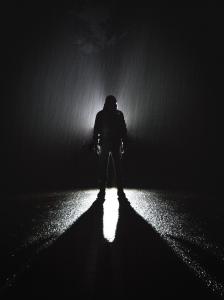
Shadow Syndicate are a group of young actors between the ages of 15 and 17 who are all studying Drama/Theatre studies. They are regular visitors to the Buxton Fringe each year bringing us a powerful new production as well as taking the opportunity to see other productions and taking full advantage of everything the Fringe has to offer.
This year is no exception. In ‘Tomorrow I’ll Be Happy’ by Jonathan Harvey the company have found a powerful play exemplifying concerns that young people have as well as some of the terrible pressures they face. In choosing to perform a play whose characters were not very much older than themselves, the actors could explore and portray the dilemmas and emotions experienced by their characters with real understanding.
‘Tomorrow I’ll be Happy’ was inspired by a real-life homophobic hate crime and the young cast bring life and vigour into their characters.
The play started powerfully; two characters stock still on stage as the audience filed in. A young, very pregnant bride sat on a bench whilst a youth stood apart from her, looking away. This was the final scene and from it we were taken back in time as the tale of what had happened unravelled. Naturalistic sequences in which the story line unfolded were interspersed with well-choreographed stylised movement scenes.
The minimalistic set design conveyed the emptiness of the lives of the characters but also gave the cast the opportunity to conjure up the surroundings through their words and actions. It was an effective device to follow the story from cliff top to beauty parlour to the old school and beyond.
Without giving away too much, acting was very good overall with some notable performances. Scott was played with sensitivity and maturity by 15 year old James. The different relationships Scott had were convincingly portrayed as was the dilemma he faced. James, the actor grew in confidence over the performance. Siddie, played by Alex, was not likeable but as his back story was revealed Alex was able to inject some sympathy into this character. There was a ‘spark’ between Cyprus, played by Isabel and Siddie in the scene they played together. Cyrpus’s concern and Siddie’s swagger were entirely believable. Isabel’s acting was excellent. She can convey an emotion with the lift of an eyebrow and also showed a talent for comedy raising a laugh from the audience with her timing. Millie-Beau, portraying the pregnant Dior gave the play its conscience. Whilst other characters had been hardened by their environment, Millie-Beau showed us compassion in her portrayal of Dior.
This is a challenging play performed very well by Shadow Syndicate. It is well worth going to see.
Viv Marriott
TROPEZ! - Nathan & Ida

Nathan and Ida were award-winners in Buxton last year and the new show, Tropez, had already been seen and got great reviews. This was a hot ticket!
Their theatre-comedy is frantic and physical. The two of them become dozens of characters - with the aid of a case full of props - and there is a lot of face-pulling (especially from Ida). The narrative is largely delivered - fluently, rapidly and clearly - by Nathan.
The storyline hardly matters (in farce style the plot is an excuse for comedy capers) and the characters are seldom around long enough to be developed. This is cartoon, comic book fun.
The story is about a couple of criminals who try to steal the second biggest diamond in the world (the Duchess of Windsor is much hurt that it's not the biggest). Setting it in St Tropez (around 1960) is excuse enough for plenty of cod-French, berets and gendarmes.
The whole thing is pacy, energetic and expertly done. The many sound and light cues were spot on (well done the technician!) The jokes come thick and fast with Nathan and Ida. The first night audience loved it; the chances are you will too.
Keith Savage
TWICE UPON A TIME - REC Youth Theatre Company

Before the start of the play Kitty Randle, one of the directors, explained that the company had read through a number of scripts and selected ‘Twice Upon a Time’ as the one they wanted to perform.
A very good choice as not only does this play illustrate themes and worries that are of concern to youngsters of this age but it is also good theatre. The young company recognised the theatrical effectiveness of devices used by ancient Greek theatre; the Chorus, the masks, the repeating dialogue, the minimalist set, the storyteller overseeing the action.
The play is in two acts; the distant future and the present. Our hero Callum meets Yelena in a dream and falls in love with her. He is tricked by the shape-shifting Cailleach to enter the Otherworld where, through a misguided sense of loyalty and sense of duty, we fear he may remain. However Yelena, supported by the voices of her ‘family’, follows Callum and they are reunited – or are they?
In line with the inclusive ethos of this company, the play is double cast with different performers taking on the same roles in each act. Not only does this create more opportunities for the actors it also worked well dramatically. The play opens strongly with Magnus the storyteller setting the magical scene. He is soon joined by a chorus of demons wearing masks that members of the company had created at workshops run by Babbling Vagabonds. The use of choral speaking, movement and individual voices by the chorus was outstanding. Sometimes the group spoke as one, other times individual voices were heard; loud, soft, warning, telling. The stillness of the chorus of family, each actor veiled in white net, contrasted well with the movement and menace of the chorus of demons. Their slow, deliberate, large dance moves were choreographed well to make full use of the space available. The fact that the actors in each group changed due to swapping roles at the interval makes the discipline and effectiveness of the chorus even more impressive.
All the main characters were played with conviction. In both acts the cast generated a feeling of concern for Yelena who had “crossed many borders” and “lost her family”. In both acts Callum’s sense of duty and Cailleach’s manipulating were well conveyed. The group of “friends” must also be mentioned. Slick, polished and very amusing in both act one and act two. In act two there was a cast member missing due to illness and, had we not been told, we would not have known so seamless was the performance.
Overall a great show. The direction by Kitty Randle and Clare O’Neil enabled the youngsters to achieve a high standard of performance. Clare’s musical accompaniment contributed well to build up of tension and drumbeat was used to great effect to reinforce the impact of the words of the chorus. Set and costumes contributed well to the very entertaining whole.
Viv Marriott
UPDOWNSIZING by Ginny Davis - Ginny Davis Productions
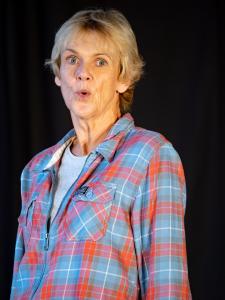
At a packed out Underground venue Ginny Davis gave us a fantastic one woman show portraying Ruth - a wife, mother and daughter, endeavouring to pack up the chaos of her family home for a pending house move. Smug in the knowledge that completion was imminent and the move would be straightforward, what could possibly go wrong? Well quite a lot as it happens, and all in the space of 24 drama packed hours.
We meet Ruth boxing up the kitchen at 24 Meadow Rise, ruminating over the term ‘Downsizing’ and why there was no concept of ‘Upsizing’, therefore it “Being a euphemism for things getting smaller, and therefore worse”.
Preparing a simple dinner for three, things gradually start to unravel. We meet convalescing son Fred with his girlfriend Rachael (with an E), homeless Tim and Eva, jobless Ellie and stinky Steve the dog, Laura and Ned, and a grouchy ‘Husband’ on his endless supermarket run to try and pacify multiple dietary requirements. Unpacking the kitchen again for her ever increasing number of dinner guests, Ruth plays amateur detective to uncover a potential pregnancy and chats away to her dead mother, who we later learn was buried dressed as a fairy at her fancy dress funeral.
After several large glasses of Sauvignon Blanc, a game of Monopoly, and the sleeping arrangements finalised everything seems much better….
Until, that is, the untimely demise of Steve who has devoured an evening’s worth of pregnancy tests, monopoly hotels and triple chocolate brownies. Add to that a birth, two more unexpected guests, and torrential flooding. Phew!
Could a bursting at the seams house and a glimpse of sunshine have Ruth reconsidering her options?
On the face of it this is a simple concept for a play, but Ginny was expert in painting a colourful picture of family life, with clever and witty writing and a wonderful portrayal of several characters. We could relate to them instantly and the audience was totally engaged throughout and chuckling away. I could definitely see this being a hit on the bigger stage.
Karen Wain-Pimlott
WE APOLOGISE FOR THE INCONVENIENCE - 5064 Productions

This two-man play opens with a backdrop screen providing a Hitch Hikers Guide to the Galaxy-esque introduction to Douglas Adams and his infamous inability to meet any literary deadline. We meet a dressing gowned Douglas six years on from his bestselling trilogy, freshly out of his umpteenth bath of the day. Holed up on a hotel room he is under strict instructions from his Editor to meet the impending deadline for book number four.
Eccentric and articulate we get taken on a journey of Adams’ procrastination, displacement activity and justification of being ‘the worlds least reliable writer’. He would rather be anywhere else than in that hotel room and battles with inner turmoil and the weight of expectation on his shoulders to produce another masterpiece.
We see a duck cameo who later evolves into a straight talking, motivating, by whatever means necessary ‘multi-dimensional hyper being’, who along with ‘Hairy Bob’ need to inspire Adams into typing action.
We learn of a loosely veiled jealousy towards Woodhouse and Cleese and the failure of ‘Dougie’ to break into Hollywood.
As the pressure mounts and the final, final, final deadline looms the self-proclaimed ‘wizz at this writing lark’ finally sits at his typewriter and happily focuses on death and destruction to conclude the Hitchhikers tale.
Clever writing and background graphics with a witty and charming performance capture this character perfectly.
You can catch further performances 13 & 17 July 1.15-2.00, 18 July 4.00-4.45, and 23 July 1.15-2.00. Bookings via underthefringe.com.
Karen Wain-Pimlott
WHITE NURSE - JustOut Theatre
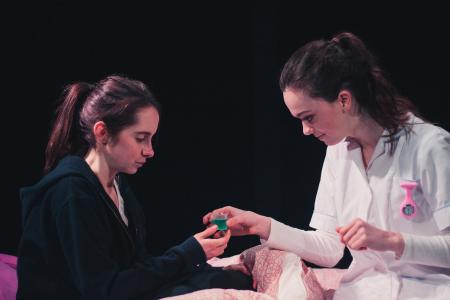
You know how much I love you, think how lucky you are. Have you ever had these words said to you? Do you think these words are spoken out of love or control? When you hear them, it can be hard to work out what is real and what is manipulation.
White Nurse is a brilliant piece of theatre showing one woman’s battle with addiction. The play is written and acted by a team where the oldest member is only 21 but all show experience beyond their years.
The playwright, Abby Coppard, was 19 when she wrote White Nurse and it shows maturity and sensitivity to the subject. It is a play of love, addiction, trust and support. It is cleverly directed by Kiera McAlister with the technical side of the production really enabling smooth transitions between moments.
I thought it was fascinating that the colour palate of the piece was pastel with the predominant colour being pink, I felt it reflected how the main character saw the world through rose tinted glasses and only when her addiction was fully addressed then the stark white reality appeared.
The nurse could have been just a nurse, she seemed to have a personal understanding of addiction ‘We’ve all been there sweetheart’. However, there was so much more to her character as Rebecca McGreevy showed. Tiny sideways glances towards the audience on administering medication made you question her, the authenticity of the medication intention and if she even really exists.
Aisling Lally as Layla was totally captivating, the way she changed emotions in the blink of an eye would put many professionals to shame. Mitchell Siddons as Joe played the ever-present menace in Layla’s life, he was truly menacing but also really charming and you could totally believe why she fell for him.
This show deserves good audiences and both the playwright, and the performers are people to watch in the future.
Jayne Marling
WITHOUT MALICE OR ILL WILL - Hand On The Tap
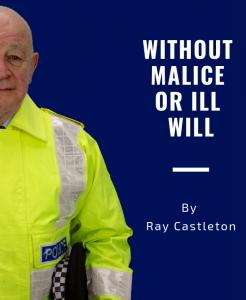
This is a one man play where a policeman called Geoff reminisces about his past and how his involvement in the battle of Orgreave during the miner's strike changes his life forever. The play opens in "Dixon of Dock Green" fashion with Geoff recounting his life as a kindly policeman, describing some incidents where he had taken care of people in need during the course of his job and joking about how members of the public perceive the police force. Geoff comes from a mining community and he describes his first job as miner, the camaraderie of the pits, how he fell in love and had a family and eventually how he left the pits and joined the police force. Geoff then goes on to relate the events of the battle of Orgreave, how he was uncomfortable with the policing arrangements and then traumatised by what happened that day. He goes on to describe how he and his family was perceived and treated back in his community in the following years.
The play is written and performed by Ray Castleton. Ray's writing is very direct and realistic with great humanity. His policeman Geoff is completely believable which makes the events of this play even more tragic. Ray was the author of "On behalf of the people" which won the award for theatrical production at last year's Fringe.
This is a definite "must see" at this year's Fringe but you need to be quick because it is only on on Saturday 6th and Sunday 7th July matinee and evening each day. Ray is also running a writing workshop on Sunday 7th from 12 until 1 at the Green Man Gallery for a small fee.
Alex Watts
WOMAN ON FIRE - Certain Curtain Theatre Company
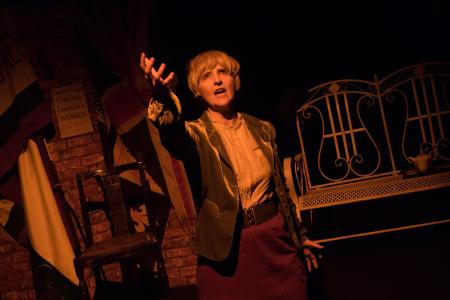
Woman on Fire by Certain Curtain Theatre Company returns to Buxton for the second year in its new venue of Underground at the Arts Centre Studio after playing at The Burbage Institute last year.
This is the story of the suffragette movement using Edith Rigby from Preston, as the face who leads the audience through the main points in its timeline. Claire Moore plays the role of Edith with a quiet dignity. She shows her character’s journey from passionate believer in equality for women to militant suffragette and has the audience attentive throughout. Claire’s performance is contained and she slips effortlessly between characters as the play unfolds. She makes strong eye contact with the audience, engaging them in her story.
The frustrating thing about this play is that Edith Rigby is an interesting woman who we find very little out about personally, as she is merely the platform used to give the audience a detailed timeline of factual events. That said, we did learn that Edith was the first woman to ride a bike in Preston, she threw a black pudding at a politician (they were considered to be more offensive than eggs or milk!) and that her husband was a supporter of her cause.
Design elements of the piece are simple yet effective. Including minimal props to convey a sense of meaning and place and Edith’s costume which was the same colours as those chosen to represent the suffragette movement, purple for loyalty, white for purity and green for hope. Suffragettes were encouraged to wear these colours to show solidarity in a crowd and as such this wordlessly displayed her solidarity to the cause throughout the piece. The purple was picked up again in the flowers carried by the older suffragettes at Emily Davison’s funeral.
Woman on Fire is an informative show in which Claire Moore produces an exceptional performance.
Jayne Marling
ZERO FOR YOUNG DUDES by Alistair McDowall - REC Youth Theatre

A group teenagers are living in some sort of camp and go on a cross country run. So far so normal. But why do some of them have grenades and why they keeping them hidden? And who is in control of the camp? Alastair McDowall's powerful play "Zero for young dudes" unfolds gradually and each scene gives further clues regarding what is going on. The first pivotal moment is where one teenagers is in solitary confinement and we discover their crime. In another pivotal scene we discover why some teenagers are practising in a firing range. Is this a jihadist-style training camp or is it closer to home? The teenager's situation eventually becomes shockingly apparent.
I can't praise this young cast highly enough. This is very much an ensemble piece and none of the plays characters have names, The eleven actors from the Rec Youth Theatre senior company are all confident and convincing keep the audience riveted and curious. Their performances cleverly juxtapose a casual normality of teenager conversations and relationships with the dramatic subtext of what is really going on the the camp. The fact that the actors come across as ordinary teenagers adds power to the occasional glimpses of the serious and sinister situation that the teenagers are in. It is hard to pick out individual performances, partly because everyone is so good but also because the cast will change on different nights and some actors have a better opportunity to shine in the more dramatic scenes. However the Fringe will consider individual actors are part of the Fringe award process.
Although written two years ago , this is a play for a world that has required a Swedish schoolgirl to show the leadership that is lacking in the politicians and businessmen of her parents and grandparents generation. It is a play about the predicament and legacy that we are leaving for our children. This is one of the best pieces of theatre in this year's Fringe and manages to be highly entertaining as well as thought provoking.
Alex Watts
ZUGZWANG by Duncan Battman - REC 30 Minute Theatre Co
The REC Theatre Company is back at Poole’s Cavern – a cheerful announcement for those who remember years of their Fringe entries of many sizes and kinds, always engaging and often award-winning. This production of Duncan Battman’s two-hander, Zugswang, follows an earlier version some years ago, which did indeed win the Fringe Best Production award. It brings Martin Beard back in the leading role, with Corinne Coward as his daughter.
Alec, newly widowed, walks out of his wife’s funeral, frustrated by the failure of the service to reflect his wife’s life or his grief: he’d rather be getting on with his game of postal chess. His daughter comes to find him, embarrassed and upset, and they have a conversation which touches on many of the inevitable and distressing aspects of bereavement and aging. She is practical, suggesting he should move in with her and her husband, while also having investigated the value of Alec’s house, and possible retirement homes. He is indignant at the ‘conspiracy’ to deprive him of his independence and choice. They move between reproaches and delicate talk about death and family, and the difficulty of saying the things they’d really wanted to say. The chess game provides a link between them, and a metaphor for a likely, though unstated, outcome, zugswang being the term for a position where a player must move, though his position will then be worse, or resign. What will Alec do?
Duncan Battman is a theatre director as well as playwright, as well as Humanist celebrant, and has clearly thought much about death and its effect on the bereaved. This is a thoughtful but not a gloomy piece. Played by Martin and Corinne it gives a convincing picture of a spiky but basically affectionate father-daughter relationship, with hope for their future – and some good one-liners.
The venue outside Poole’s Cavern worked very well on a balmy summer evening with no midges (thank you Buxton). It is a pity the show isn’t in the Fringe brochure, though it is on the website. It is also showing on Tuesday 16th, Wednesday 17th an Thursday 18th July, 6.30 – 7pm, and is very well worth the visit. I shall remember the characters and their dilemma.
Ursula Birkett



